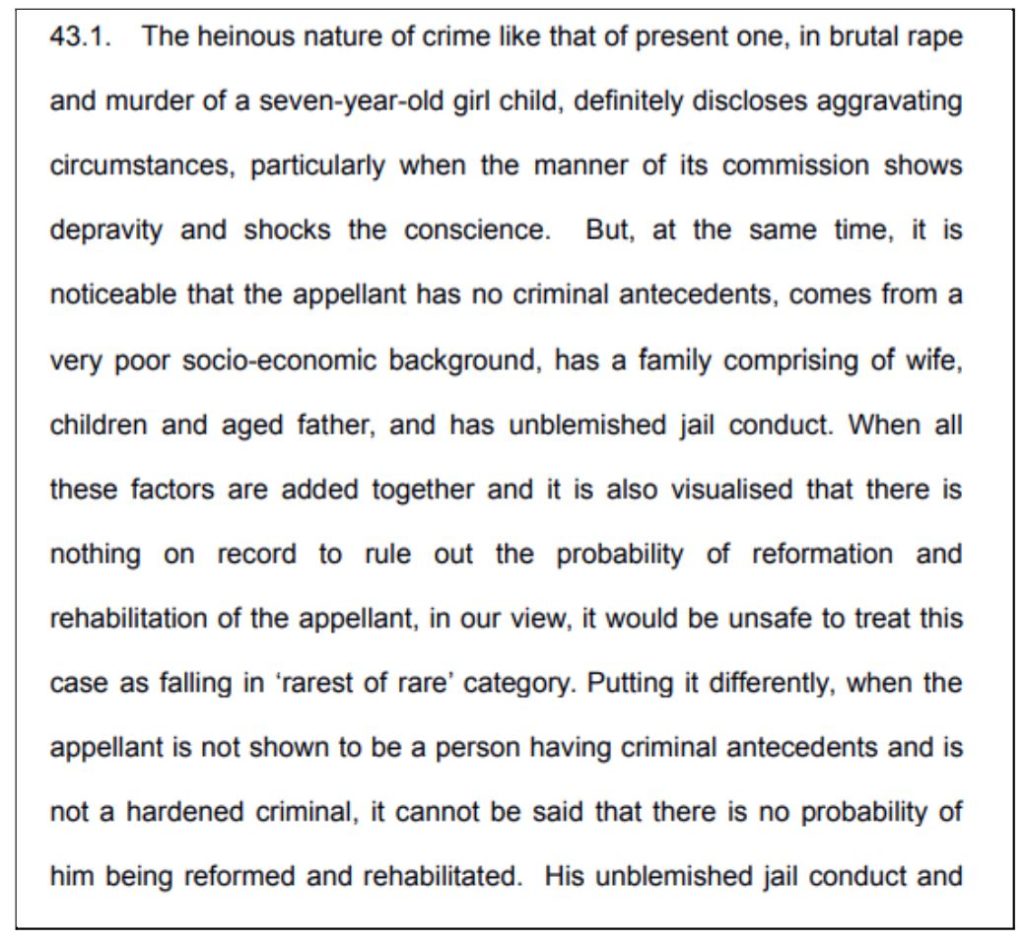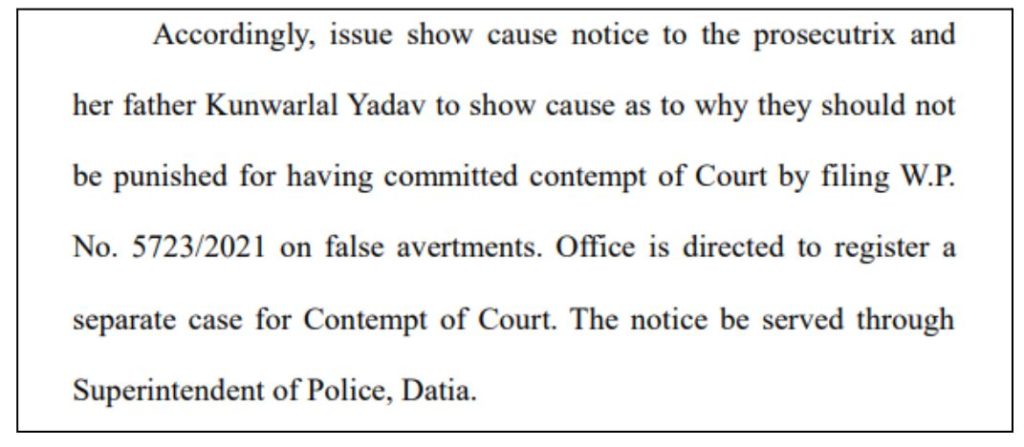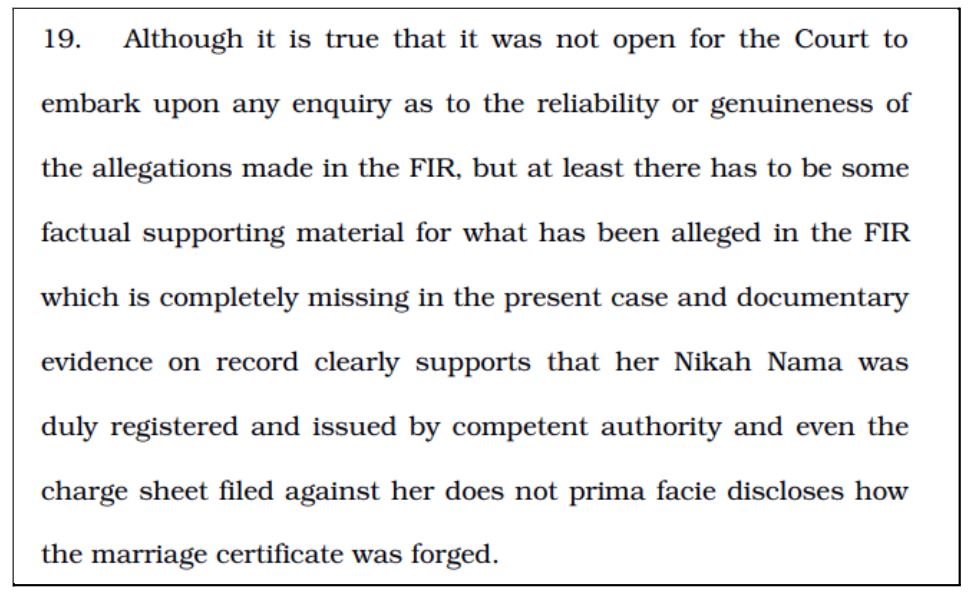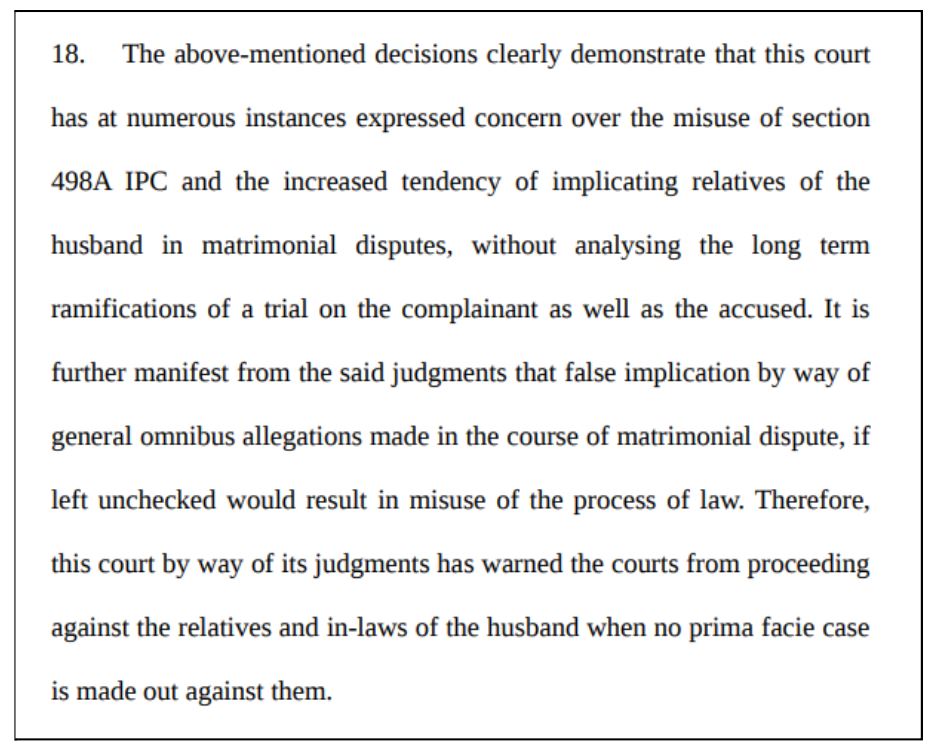In this roundup of Court Judgements, we look at the Supreme Court’s observations & directions about how the abhorrent nature of the crime should not be solely considered for capital punishment, and other mitigating factors should be considered, that there should be factual evidence for FIR allegations, how section 498A is increasingly being used to settle personal scores against husband and his relatives, that age of deceased should be the basis for calculation of compensation in a motor accident, etc.
SC: Abhorrent nature of the crime should not be solely considered for capital punishment, other mitigating factors should be considered
In Pappu vs. State of UP, the appellant was convicted by Trial Court in 2016 for raping and killing a seven-year-old girl and hiding her body. The Additional Sessions Judge noting the heinous nature of the crime committed did not find any reason to show any mercy in punishment and awarded varying punishments, including that of death sentence for the offence under Section 302 IPC. While hearing the case for confirmation of death sentence and the appeal filed by the accused, the Allahabad High Court stated that the case was ‘rarest of rare case’, where the sentence of death was considered ‘eminently desirable’, taking into consideration the brutality of the act. The High Court dismissed the appeal and confirmed the death sentence awarded by the Trial Court.
The Supreme Court Bench comprising Justices AM Khanwilkar, Dinesh Maheshwari and CT Ravikumar when hearing the appeal, noted that both the Trial Court and the High Court looked into the abhorrent nature of the crime and its repulsive impact on the society for confirming the death sentence. The SC noted that, however, both the Courts did not consider the mitigating factors and the option of any other punishment other than the death sentence. It disapproved of the approach of both the Courts to award punishment.
The Bench noted that the appellant had no criminal antecedents, hailed from a very poor socio-economic background, had a family comprising of wife, children, and aged father, and unblemished jail conduct. It stated that the possibility of reformation and rehabilitation cannot be ruled out and commuted the appellant’s death sentence to an imprisonment for 30 years without premature release or remission.

MP High Court: Issued contempt notice to prosecutrix and father for obtaining abortion order by filing false rape case resulting in the death of an unborn child
In Sonu Parihar alias Nathu vs. State of MP and Anr., the Madhya Pradesh High Court expressed that “the case in hand depicted the very shocking state of affairs”. A writ petition was filed by the father of the Prosecutrix for medical termination of pregnancy of his daughter stating that she was a minor of 16 years and that she was subjected to rape. Citing this, he claimed that she got pregnant and wanted to terminate it.
The Applicant who was alleged of rape and later arrested, filed an application with the High Court which noted that the Prosecutrix had turned hostile. She claimed that she was major, and no offence was committed with her. Even her father had not disclosed her date of birth. The Trial Court had permitted medical termination of pregnancy considering that she was a minor. The High Court noted that she had narrated a false narrative and her father had filed a writ petition on false averment. The High Court stated that an unborn baby was killed because of this and that the conduct of the prosecutrix and her father could not be tolerated. It directed the office to register a case for Contempt of Court against them.

SC: There should be factual evidence for FIR allegations
In Shafiya Khan @ Shakuntala Prajapati vs. State of UP, the appellant approached the Supreme Court against the Allahabad High Court’s dismissal of a petition filed under Section 482 CrPC seeking quashing of FIR filed against her. The appellant’s brother-in-law had filed a case alleging that she harassed his late brother mentally and physically which was the reason behind his death. Following the death, the accused (appellant) threatened and abused the family members and got a job on compassionate grounds and took all the terminal benefits, according to the brother. She approached the Supreme Court stating that there is no evidence to support the allegations against her, based on which the FIR was registered.
Citing the judgment in State of Haryana and Others vs. Bhajan Lal and Others, the Supreme Court Bench of justices Abhay Rastogi and Abhay S Oka quashed the proceedings against the appellant since there was no material placed on record by the brother-in-law (complainant) to justify the allegations which were made in the complaint based on which an FIR was registered. It added that there should be some factual supporting material for what has been alleged in the FIR. The Bench stated that continuing the proceedings would be an abuse of the process of law and mental trauma for her, which has been overlooked by the High Court. It also stated that the power of quashing criminal proceedings should be exercised very sparingly and cautiously, in rarest of rare cases. Further, it stated that the inherent powers do not confer any arbitrary jurisdiction on the Court to act according to its whims and fancies.

SC: Section 498A is increasingly being used to settle personal scores against husband and his relatives
In Kahkashan Kausar @ Sonam vs. State of Bihar, the wife lodged a criminal complaint against her husband and the appellants before the Court of Chief Judicial Magistrate, Purnea alleging that they demanded dowry and harassed her. The husband and his relatives filed a criminal writ petition before the Patna High Court, for quashing the FIR lodged by the wife. The Patna High Court dismissed their petition and called for an investigation by police. Dissatisfied with the order, they filed an appeal at the Supreme Court on grounds that the FIR had been made by the wife with a revengeful intent, merely to harass them. The issue before the Supreme Court was whether allegations made against the appellants are general omnibus allegations that are liable to be quashed.
The Bench of Justices S Abdul Nazeer and Krishna Murari before moving into the details of the case stated that the purpose of section 498A of IPC was to prevent cruelty inflicted upon a woman by her husband and in-laws, by facilitating rapid state intervention. They also noted that with the rising matrimonial litigations in the country, there has also been an increased tendency to misuse the provisions like this, to settle personal scores against the husband and his relatives.
Referring to previous judgements, the Bench stated that the Court had expressed its concern over the misuse of the legislation multiple times previously, and so if it is left unchecked, it would result in the misuse of the process of law. The Court warned that courts should not carry out proceedings against the relatives and in-laws of the husband when no prima facie case is made out against them. That is, there should be sufficient proof or specific allegation for the proceedings to take place.
In this case, going through the FIR, the Bench noted that there was no distinct or specific allegation made by the wife and hence allowed the appeal by quashing criminal proceedings against the appellants stating that the allegations were general and omnibus and were made because of small clashes between them. It highlighted that a criminal trial that leads to eventual acquittal inflicts severe scars upon the accused which should be discouraged.

SC: Age of deceased should be the basis for calculation of compensation in a motor accident
In R. Valli vs. Tamil Nadu State Transport Corporation Ltd., a 54-year old succumbed to head injuries in 2011 when he was riding a two-wheeler and met with an accident with the TNSTC’s bus. Based on his income and age, the Motor Accident Claim Tribunal, Chennai awarded a compensation of Rs.13,82,628. The Madras High Court asserted the findings recorded by the Tribunal in respect of multiplier of three (3) up to the date of superannuation and thereafter multiplier of eight (8) keeping in view the dependency of life for 10 years (Rs. 15,12,628 was to be awarded to the claimants) when hearing the appeal by the claimants.
The appeal was then filed with the Supreme Court on grounds that the multiplier methodology adopted by the Tribunal and the High Court was erroneous and not sustainable. It argued that the remaining years of service were not considered but only the age and income at the time of death were taken into consideration.
Referring to past judgement, the Apex Court Bench comprising Justices Hemant Gupta and V. Ramasubramanian held that the age of the deceased should be the basis for applying the multiplier and the method using two multipliers was erroneous.

The Bench allowed the appeal and held that the claimants were entitled to a compensation of Rs. 24,33,064 with an interest of 9% from the date of filing of the claim application till realization.
SC: OCI students should be treated on par with Indian students for any course in 2021-22
The Supreme Court Bench comprising Justices Abdul Nazeer and Krishna Murari allowed the petitioner, an OCI student, to be treated at par with her Indian counterparts and allowed her to apply for Bachelor of Ayurvedic Medicine and Surgery (BAMS) course in general category seats for the academic year 2021-22. It stated that Overseas Citizens of India (OCI) are to be treated at par with Indian students and be allowed to apply in general category seats in any courses, for the academic year 2021-2022. This order came as a result of a petition filed against IIT Madras which charged different fees for OCI students and Indian students. Earlier, the Court had asked the respondent (IIT Madras) to consider the petitioner at par with the Indian citizens regarding the fee charged.
Featured Image: SC on the usage of Section 498A


